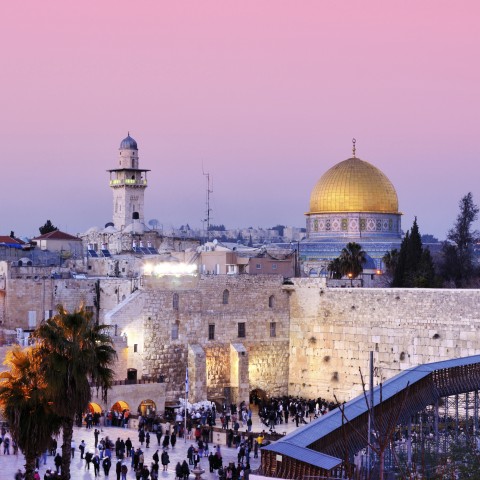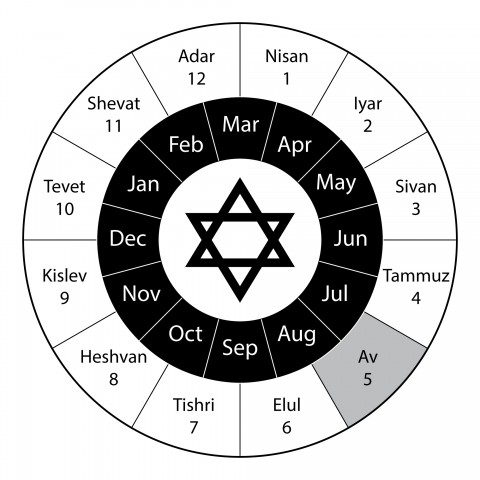
Israel had a particularly rough history, fraught with tragedies and wrongs. Each year, there’s a special day set aside just for mourning and reflection: תשעה באב (Tish-ah be-Av), or “Tisha B’Av.”
In this article, we’ll talk about some of these tragedies, cover the most common Tisha B’Av practices and customs, and go over the most important Tisha B’Av vocabulary.
Let’s get started.

1. What is Tisha B’Av?

Tisha B’Av is a day of אבל (evel), or “grieving,” for Jews, and it serves as a time to commemorate the many tragedies that Israel has experienced. In particular, Jews mourn a collection of events that are often referred to as “the five calamities.” These events all took place on or around the date of Tisha B’Av, giving this day a negative reputation. Here’s an overview of each calamity:
1 – Moses’s Twelve Spies in Canaan
In the biblical book of Numbers, it’s said that Moses sent out twelve spies (or observers) to explore the land of Canaan, God’s “Promised Land” to Israel.
However, ten of the twelve spies gave Moses only negative reports about the land and its people (whom the spies called Nephilim). These reports led to widespread fear among the Israelites and revealed the spies’ lack of faith in God’s promise. As a result, God made the Israelites wander in the wilderness for forty years.
Two of the spies gave Moses a positive report, and those two were the only ones allowed to enter the Promised Land after those forty years.
2 – Destruction of the First Temple
The destruction of the first temple of Israel (which was built by King Solomon) occurred in either 587 BC or 586 BC, when King Nebuchadnezzar II of Babylon invaded Judah. This happened as a result of Judah’s then-vassal king turning his back on Babylon and backing the Pharaoh Hophra of Egypt instead.
3 – Destruction of the Second Temple
The destruction of the second temple occurred in 70 CE at the hands of the Romans. This led to the people of Judea becoming scattered and marked the beginning of Israel’s גלות (galut), or “exile,” from the Holy Land.
4 – Destruction of Betar
In 135 CE, the Romans destroyed the Jewish city of Betar following a strong revolt led by Bar Kokhba. This event resulted in the deaths of nearly 600,000 Jews.
5 – Plowing of the Temple in Jerusalem
Not long after this massacre, a Roman commander named Turnus Rufus plowed over where the Temple of Jerusalem had once stood.
—
While Tisha B’Av largely encompasses these five tragedies, this day is also a time to reflect on more recent ones, such as the First Crusade and the Holocaust.
- Thirsty for more cultural and historical knowledge? Log in to see HebrewPod101’s lessons on the Top Five Things You Need to Know About Israeli Society (beginner) and Studying Ancient Israeli History (advanced).
2. When is Tisha B’Av on the Gregorian Calendar?

Each year, Tisha B’Av takes place on the ninth day of the Hebrew month of Av. For your convenience, we’ve listed below this holiday’s date on the Gregorian calendar for the next ten years.
- 2020: July 30
- 2021: July 18
- 2022: August 7
- 2023: July 27
- 2024: August 13
- 2025: August 3
- 2026: July 23
- 2027: August 12
- 2028: August 1
- 2029: July 22
Keep in mind that this holiday actually starts on the evening before the date listed.
3. Tisha B’Av Customs & Restrictions

There’s a three-week period leading up to Tisha B’Av, during which Jews may begin the mourning process. While mourning, Jews may fast from meat and neglect to shave. Those who don’t mourn during these three weeks will usually begin their mourning during the last nine days before Tisha B’Av.
As mentioned earlier, Tisha B’Av is a time of grieving. On this day, practicing Jews are not to engage in any type of pleasurable activity. In addition, Torah reading for Tisha B’Av is limited to the מגילת איכה (Megilat Eicha), or “Book of Lamentations,” and other sad or grievous books.
1 – Tisha B’Av Restrictions
There are חמישה איסורים (khamisha Isurim), or “five prohibitions,” that practicing Jews must adhere to on Tisha B’Av. These Tisha B’Av rules are:
- Fasting for twenty-five hours (especially from meat and wine)
- No showering
- No intimate relations
- No leather shoes
- No creams or oils
Of course, there are limited exceptions to these rules. For example, if someone has a specific medical issue, they may consult a rabbi to permit them to eat as needed.
2 – Other Customs & Activities
On Tisha B’Av, Kinot text readings and liturgies are given in the synagogues, and many Jews also read or listen to the Book of Lamentations. Both the Kinot and Lamentations mourn the destruction of Israel and the plight of Jews throughout history.
Because this is a day of mourning, Jews tend to abstain from many day-to-day activities, especially those that are considered pleasurable. Examples include gift-giving and leaving the home for entertainment purposes. People are expected not to laugh or smile on this day, as Tisha B’Av is often labeled “the saddest day” on the Jewish calendar and a day on which bad things are likely to happen.
3 – End of Tisha B’Av
Tisha B’Av officially ends that night, though generally, Jews observe the rules and fasting until around noon of the following day.
- Since you’re here, why not learn the names of different religions in Hebrew?
4. Menachem Begin’s Proposal
Former Prime Minister of Israel, Menachem Begin, once proposed that Tisha B’Av should become a holiday devoted to all of Israel’s tragedies. Under this proposal, Holocaust Remembrance Day, Memorial Day, and Tisha B’Av would all be observed on this one day.
His proposal was denied, however, probably as a means of preserving the significance of each remembrance day and the religious nature of Tisha B’Av.
5. Vocabulary for Talking About Tisha B’Av in Hebrew

Let’s review some of the Hebrew vocabulary words and phrases from this article!
| English | Hebrew | Romanization | Part of Speech + Gender |
|---|---|---|---|
| Jerusalem | ירושלים | Yerushalayim | Proper noun, feminine |
| Tisha B’Av | תשעה באב | Tish-ah be-Av | Noun, masculine |
| Fasting | צום | tsom | Noun, masculine |
| Av | אב | Av | Noun, masculine |
| Destruction of Jerusalem walls | נפילת חומות ירושלים | Nefilat khomot Yerushalayim | – |
| Burning of the Temple | שריפת בית המקדש | srifat beit ha-mikdash | Feminine |
| Book of Lamentations | מגילת איכה | Megilat Eicha | Noun, feminine |
| Grieving | אבל | evel | Noun, masculine |
| Between the gates | בין המצרים | bein ha-metzarim | Masculine |
| Cloth shoes | נעלי בד | na’alei bad | Noun, feminine |
| No intimate relationship | איסור תשמיש המיטה | isur tashmish ha-mitah | Noun, masculine |
| No shower | איסור רחיצה | isur rechitzah | Noun, masculine |
| Kinnot | קינות | Kinot | Noun, feminine |
| Five prohibitions | חמישה איסורים | khamisha Isurim | Masculine |
| Exile | גלות | Galut | Noun, feminine |
Remember that you can find each of these words with an audio recording of its pronunciation on our Tisha B’Av vocabulary list!
Final Thoughts
The significance of Tisha B’Av in Jewish society can’t be overstated. It provides an opportunity to reflect on past wrongs, mourn accordingly, and look ahead to what the future may hold.
What are your thoughts on Tisha B’Av? Is there a holiday of mourning or remembrance in your country? Let us know in the comments; we look forward to hearing your thoughts.
If you want to learn more about Israel and Jewish culture, HebrewPod101.com has several free resources for you, straight from our blog:
- Purim in Israel: How to Celebrate the Purim Holiday
- Tu BiShvat: How to Celebrate the Jewish Tree Holiday
- Rosh Hashanah: How to Celebrate the Jewish New Year
- Day of Atonement: The Holy Day of Yom Kippur
- Hanukkah: Celebrating the Jewish Festival of Lights
Wherever you are in your Hebrew-learning journey, and whatever your reasons for wanting to learn, HebrewPod101 has you covered! Create your free lifetime account today and take advantage of our numerous audio and video lessons, themed vocabulary lists, spaced-repetition flashcards, and so much more.
We hope to see you around. Shalom!










